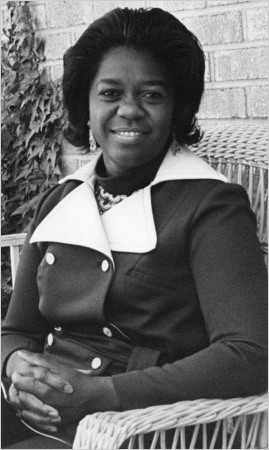 Last month, civil rights trailblazer Juanita W. Goggins passed away in her home (h/t).
Last month, civil rights trailblazer Juanita W. Goggins passed away in her home (h/t).
Goggins was the first African-American woman to be elected to the South Carolina state legislature, in 1974. She served three terms before retiring. Among her many other accomplishments, she was also the first black woman from South Carolina to be represented at the Democratic National Convention two years before her election, in 1972, and the first black woman appointed to the United States Civil Rights Commission.
Many of Goggins’ obituaries are focusing on the sad story of her death. While those circumstances are worth discussing for several reasons (and you can follow the links to read about them), here I would like to center and celebrate the many important achievements she had throughout her life (all emphasis mine):
Several neighbors in her elderly, mostly black community in downtown Columbia said they had learned the full scope of Ms. Goggins’s accomplishments only from her obituaries. At the peak of her political career, in the 1970s, she twice visited President Jimmy Carter at the White House and was the first black woman appointed to the United States Civil Rights Commission.
In the legislature, where she represented Rock Hill, on the northern border of the state, for three terms in the 1970s, Ms. Goggins, a Democrat, helped pass key legislation for improving elementary school education and public health. Last year, a stretch of Highway 5 was renamed in her honor.
“She was truly a mover and a shaker, so well-liked and so well-loved by so many,” said Representative John King, 33, who holds her former seat in the General Assembly.
…
Those achievements include teaching public school, founding a tutoring company and in 1972 becoming the first black woman from South Carolina to be a delegate to the Democratic National Convention. Ms. Goggins was elected to the State House in 1974, defeating a white male incumbent.
“I am going to Columbia to be a legislator, not just a black spot in the House chambers,” she told The Associated Press at the time. Voters, she said, “were ready to accept a person who was sincere and concerned about things. Those feelings go beyond color.”
In the legislature, Ms. Goggins helped expand kindergarten classes, reduced student-teacher ratios and approved sickle-cell anemia testing in county health departments.
The AP adds:
Goggins, the youngest of 10 children, grew up the daughter of a sharecropper in rural Anderson County, about 130 miles northwest of the capital. She was the only sibling to earn a four-year college degree. Her bachelor’s in home economics from then-all-black South Carolina State College was followed by a master’s degree.
She taught in the state’s segregated schools, married a dentist and got into politics. In 1972, she became the first black woman to represent South Carolina as a delegate to the Democratic National Convention. Two years later, she became the first black woman appointed to the U.S. Civil Rights Commission.
…
She sat on the powerful House budget-writing committee and was responsible for funding sickle-cell anemia testing in county health departments.
The former teacher also helped pass the 1977 law that is still the basis for education funding in the state. Her proposals to expand kindergarten and to reduce student-teacher ratios in the primary grades were adopted after she left politics in 1980, citing health issues.
…
Her son said she worked several years as a case manager for the state Department of Health and Environmental Control, although a spokesman said the agency had no records of her employment. At one point, she also started a nonprofit tutoring service called the Juanita W. Goggins School of Excellence.
That is a hugely impressive list of achievements, and Ms. Goggins sounds like an immensely impressive woman. I’m very sad and regretful to say that I had never heard of her and her work until after her death, but I am grateful and honored to have the chance to learn and write about her now. She fought for those who needed her to fight, broke down barriers, worked towards social justice, and was one of many heroes who helped to get us to where we are today.
Her son Horace Goggins says:
“I would like for her to be remembered as a woman who cared about her community,” he said. “I want her to be remembered as a positive role model, not only for African-American girls, but also any young girl who has a want and a desire to make a change and do something positive.”
Thank you, Juanita W. Goggins, for your work and public service. Rest in peace.